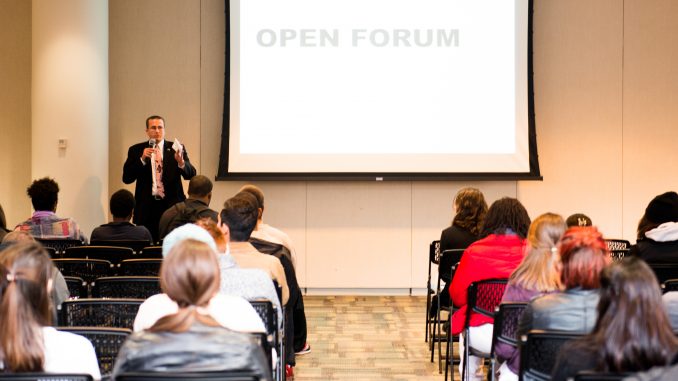
Amidst recently heightened safety concerns on campus following the standoff on Willington Street and the attack on a professor in Anderson Hall, Temple Student Government announced last week a series of proposals to the university addressing five security concerns.
TSG members met with university officials three weeks prior to the official announcement of the suggestions at the Nov. 11 General Assembly meeting. The five proposals called for a more efficient ID-checking system in campus buildings, expanding the alert system, more consistent alert labeling, a website compiling a list of all alerts and a review of security in the Student Center.
“My read of it in general is that it’s very constructive,” said Jim Creedon, senior vice president for construction, facilities and operations. “Certainly if there are ideas that are coming, we take them very, very seriously. And if they can be implemented, we’ll certainly do our very best.”
Of the five suggestions, officials have not yet made concrete plans regarding the system of checking IDs or a website that would compile alerts.
Using the University of Cincinnati’s Public Safety website as an example, Temple’s Student Body President Darin Bartholomew said the program to create a website compiling alerts is free and would be a quick installation.
“Technically it’s not difficult, but bureaucracy-wise, it can be,” Bartholomew said. “There’s a lot of moving parts there. It’s not just putting the software onto the website.”
Creedon said a timeline for this proposal will be determined later this week and that a more efficient ID-checking system is a long-term goal of the university. The leading proposed solution would be swipe-card access with gates similar to the system in place at access-points to the residential wings of Morgan Hall, Creedon said. These gates are also planned to be implemented in the new Science Education and Research Center, with further installation in other buildings to be determined.
The other three suggestions have begun to be implemented with some already in practice. University officials have agreed to send out all TU Alerts by both email and text messages. They have also agreed to label all communication as an alert to avoid confusion caused by dictating the severity of a situation.
As part of this change, the official Temple Twitter account, followed by more than 27,000 users, has started tweeting TU Alerts.
At Anderson Hall, guards have recently been stationed by one-way exit doors to prevent students and faculty from allowing outsiders in as they open the doors.
“We’ve done that as an interim step,” said Charlie Leone, acting executive director of Campus Safety Services. “Eventually we’re looking more long term.”
Leone said the university is considering making many of these one-way doors for emergency use only by setting up alarms on them and requiring all traffic in and out to go through the main entrance.
For the last suggestion, which calls for a review of safety personnel in the Student Center, Leone said CSS is installing an electronic check-in system for officers assigned to the building. This system is already in use for cops on bikes to check in throughout their patrols.
“The purpose of [check-ins] is accountability, to make sure that the officer is doing what we’re asking them to do,” Leone said. “What that’s going to do is keep the officers where they need to be.”
This reform is expected to be finished in the next couple of days, Leone said.
When asked about further security suggestions in the future, Bartholomew didn’t rule out the possibility.
“When you deal with safety you never want to say, ‘We dealt with it once this year, we’re not going to deal with it anymore,’” Bartholomew said. “So if there’s a need, we’ll think about it again.”
Marcus McCarthy can be reached at marcus.mccarthy@temple.edu or follow on Twitter @Marcus.McCarthy6.



What Temple needs to do is STOP buying their electronic security through the lowest bid distribution channels and installing themselves and START utilizing the expertise that is available to them through qualified Security System Integration companies.